Quality education plays an essential role in developing sustainable, equitable and resilient societies. More than being an objective in itself, education is also an enabler of equity, green communities, digital transformation, sustainable growth, migration mitigation and global peace and security.
Education is at the heart of the Sustainable Development Goals. It is a fundamental human right, an essential building block of human development, and a necessary foundation and catalyst for achieving the geopolitical Commission's priorities. Therefore, the EU Commissioner of the Directorate General of International Partnerships (INTPA), Jutta Urpilainen, has decided to boost the share of education in the International Partnerships portfolio.
The EU is working with approximately 100 countries to ensure inclusive and equitable quality education for all. Using and reinforcing existing practices from within the system builds legitimacy and buy-in. In this way, reform is seen as home-grown and more sustainable[1].
Why is the role of education crucial in building a better future?
- 171 million people, the equivalent of a 12% cut in global poverty[2], could be lifted out of poverty if all students in low-income countries completed school with basic reading skills;
- 420 million people, half the number of the poor worldwide[3], would be lifted out of poverty if everyone had access to secondary education;
- 200,000 disaster-related deaths in the next 20 years[4] could be prevented by universalising upper-secondary education by 2030.
Good practices of EU-funded educational programmes
Federal Republic of Nigeria
The Accelerated Basic Education Programme (ABEP) is a strategic response to bring children who had their education interrupted and those who have never been to school back to school. A consortium made up of Plan International and Save the Children is implementing this EU-funded project through a nationally approved curriculum called Accelerated Basic Education Curriculum (ABEC).
The programme focused on providing unique learning experiences to the students; therefore enabling them to acquire basic knowledge, skills and competencies sufficient for mainstreaming and coping with the curriculum contents in the formal school system.
Lao People's Democratic Republic
The Basic Education Quality and Access Programme (BEQUAL), led by the Government of Laos with support from the EU and the Australian Government, aims to help approximately 740,000 children receive quality education, particularly those experiencing disadvantages: girls, students with disabilities, and children from remote areas.
In the first five years of the programme, almost 400,000 children have enrolled in basic education, 359 trained ethnic teachers have been deployed in their local communities, 582 school infrastructures have been upgraded in 45 disadvantaged districts of nine provinces, and primary curriculum materials have been developed at national scale Grade 1 and 2.
The International Day of Education (24 January) is an opportunity to remind the public that education is the greatest tool we have to achieve fairer societies. Now more than ever, efforts are needed to improve and revitalise education for the COVID-19 generation. According to Commissioner Jutta Urpilainen, "the current crisis risks reversing decades of progress towards education for all. We must re-focus attention towards Sustainable Development Goal 4 as education is part of the solution[5]”.
How is education contributing to the geopolitical priorities of the Commission and INTPA?
Find below an overview of some of the education policies and programmes which contribute to the geopolitical priorities of the Commission and INTPA.
Education addresses both the causes and the impact of climate change.
Education has a substantial impact on the transition towards a green economy, and fosters adaptive and resilient communities by raising environmental awareness and bringing new skills through. EU programmes focus on:
- investing in quality and climate-relevant education, so people have the skills and knowledge to take up livelihood options, more sustainable production and consumption practices, and reduce negative coping strategies;
- improving the resilience of education systems (infrastructure, flexible schedules, adaptations for people on the move, budgeting and interventions to target the vulnerable).
Education unlocks the potential of digital technologies.
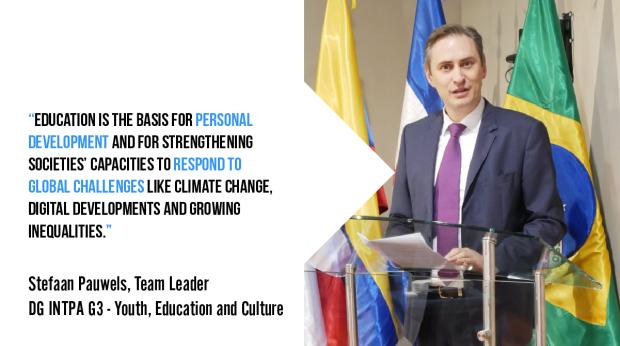
Education lays the foundations for digital skills - literacy, numeracy, and critical thinking - which are the basis for employability in the 21st century.
"Our intention is to support the government in providing an education which leaves no one behind. We want to promote inclusive education which means that all students, regardless of gender, ethnicity or disability, can attend and are welcomed in the educational institutions," said Charlotte Adriaen, Head of Cooperation, EU Delegation to Kyrgyzstan.
Education also improves media literacy by promoting safe use of the internet for social and economic development. This involves:
- supporting governments to develop cost-effective and equitable strategies to use ICT in education, including focus on curriculum, teacher training, media literacy, system management, and monitoring data for more advanced and specific digital skills;
- applying lessons from the COVID-19 crisis to develop remote learning opportunities;
- building partnerships with the private sector to increase equitable access to technology and connectivity for schools which prioritise foundational literacy, numeracy and soft skills from the early years.
Education creates a skilled workforce contributing to economic growth and reducing gender gaps.
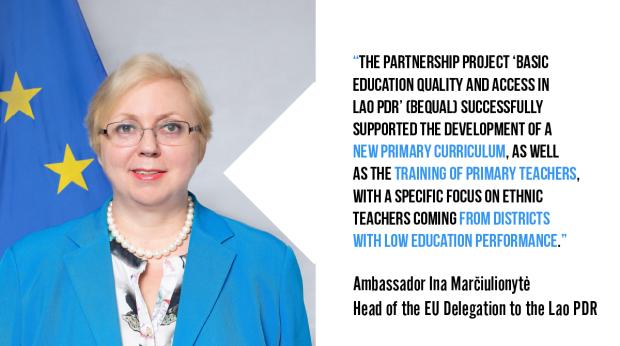
- investing in improving teaching quality and learning pathways from pre-school, through basic education for all, to expanding secondary and
- relevant tertiary education;
- strengthening planning, financing and information systems to ensure education and training systems meet the needs of the labour market;
- boosting systems for setting quality standards and accreditation of skills training.
Education is crucial for the well-being and future of children on the move.
Education enables children on the move to realise their potential through integration into host-country systems. The EU supports the New York Declaration and Comprehensive Refugee Response Framework to ease pressure on host countries and communities, increase refugee self-reliance, and help safe return to countries of origin. It works with partner countries by:
- supporting frameworks to integrate migrants and forcibly displaced learners into national systems, including school expansion, curricular reform and regional/global accreditation frameworks;
- supporting interventions that protect children's right to education on the move and addressing the barriers they face. Programmes and policies can also improve the resilience of education systems to cope with emergencies.
Education unlocks solutions to problems of weak governance and conflict.
Education enables transformation when the educated exercise their voting rights and voice in local forums. They are more likely to respect diversity, engage in communities, and see themselves as global citizens. The EU is:
- promoting equality and peace through education system strengthening and coordination across the humanitarian-development-peace nexus;
- promoting the Safe Schools Declaration and protection of schools from attack;
- supporting system resilience (e.g. eliminate bias from curricula/textbooks, accelerated education, support for teachers, remote learning, disaster-resilient infrastructure).
Click on the play button below to watch our video about EU education policies and programmes.
The examples of EU-funded initiatives and the different policies and programmes implemented by the EU, highlight the transformational power of education. To find out more, check the 15 reasons to invest in the future document.
Credit: Video © Capacity4dev | Photo ©EU Delegation to Lao People's Democratic Republic
[1] Extract from “Practical guidance notes: 4. Capacity development for education system strengthening”
[2] EFA Global Monitoring Report, EFA Global Monitoring Report 2013-2014: Teaching and Learning: Achieving Quality for All, Summary, UNESCO: Paris, 2014, p. 22
[3] Poverty Through Universal Primary and Secondary Education, June 2017, p. 11
[4] UNESCO, Global Education Monitoring Report: Education for People and Planet: Creating Sustainable Futures for All, 2016, p. 33
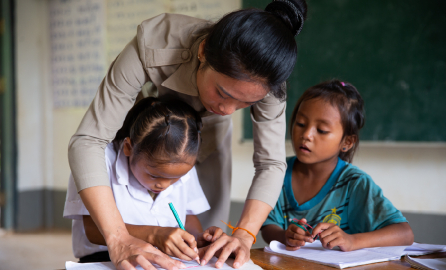



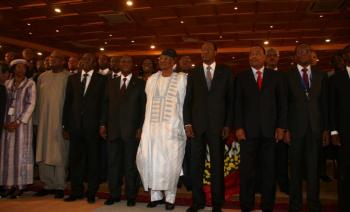
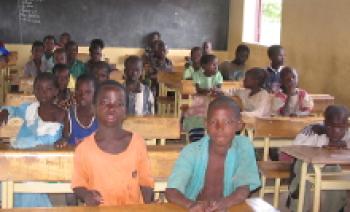
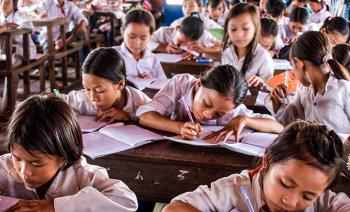
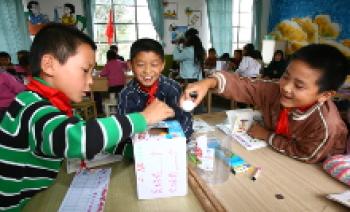
Log in with your EU Login account to post or comment on the platform.